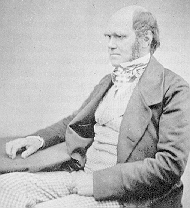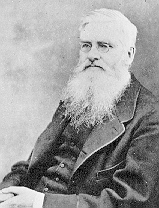Controls
Darwinian Natural Selection
|
 
Charles Darwin (left) and Alfred Wallace (right). (Figures from: Futuyama (1986), p. 5) |
Charles Darwin is most often credited with the development of the theory of natural selection. Natural selection, a theory of evolutionary mechanisms, says that organisms change over time (i.e., over generations) due to the selective pressures they must cope with in the environment.
Darwin, began formulating his theory of natural selection more than twenty years before publishing Origin of the Species in 1859 while on the famous world voyage of the scientific research vessel, the Beagle. Darwin was quite concerned about how the public would perceive his theory and held off on the publication of his work for years.
In fact, had Alfred Wallace, a young natural historian working not sent Darwin a copy of a paper he was working on, Darwin may have held off publication of Origin of the Species even longer. Wallace had, quite independently of Darwin, arrived at the same theory of natural selection. At the urging of his friends Darwin agreed to present his theory, along with Wallace, at a meeting of the Royal Society. Wallace graciously deferred to Darwin, who spoke first. Darwin became famous for his theory of natural selection while Wallace is largely forgotten.
There are some interesting lessons to be drawn from this, especially in the modern academic era of "publish or perish". Consider: is a little accademic competition good, whereas too much warps and twists the ideals of science. You may remember several years back when two research labs raced to be the first to report success in generating cold fusion. As it turned out, neither lab had actually produced cold fusion, but in the frantic rush to "win the race" mistakes were made. For those of you who have an interest in social psychology, cultural anthropologyl, history, or sociology, you might find it interesting to reflect on how science is being altered by the modern drive to produce valuable commodities from research.